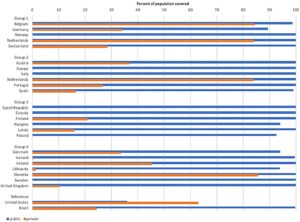Around four-fifths (79%) of UK health expenditure is paid for through public revenues, mainly taxation. This is due to the strong UK NHS provision for care. Around 13% of the UK population has private medical insurance according to the Office of National Statistics. In addition, there are increasing numbers of people undertaking 'healthcare tourism' and travelling around Europe and the world to access the medical treatments they want, when they want them.
According to Dominic Montagu, 2021, this compares to Belgium with 85%, 35% in Germany, 0% in France, Italy, Sweden and Norway, 85% in Netherlands, 28% in Switzerland and 18% in Spain for supplementary private care (see picture below) provision.

What is Private Healthcare?
Private healthcare is defined as services outside a national health provision. This means services not paid for by state taxation systems, charities, or non-profit organisations. It can be paid for direct or through an individual’s personal health insurance.
As this care is independent, there is the option for the patient to choose the treatment provider and location, unlike with public care where treatment is based on clinical necessity, location and budget allocations.
What Are The Advantages Of Private Healthcare?
Depending on the country of public health provision, private healthcare usually provides a more timely, tailored, and high-quality service than public healthcare. It can give patients quick access (with no waiting lists) to medical treatments, and the choice of the location where they would like to be treated. Private healthcare can also provide treatments (such as cosmetic treatments not considered clinically necessary) outside the public care provision of public care providers like the NHS.
Private healthcare in the UK used to be an option considered only available to the very wealthy elite. This is different to countries such as the Netherlands, where private care and public care are considered a private choice. However, recently in the UK, more and more private companies are offering private healthcare as a perk for employees, widening access to the private healthcare system.
In the French equivalent of the NHS, the majority of patients must pay the doctor or healthcare provider upfront. The state then reimburses them in part or in full, but the patient has freedom to choose which professional and where to visit.
In Sweden, public and private care costs the same. In Spain all healthcare is free except dental treatments and eye care. Whereas in Italy all healthcare is state funded.
Can You Access The National Health Service If You Are Not A UK Or European Citizen?
Public healthcare requires you to be a national of a country. For the UK, this involves having a valid National Insurance card. If a European citizen travels to Europe, they must have a valid European Health Insurance Card (EHIC).
A UK citizen must now (after Brexit) have a Global Health Insurance Card (GHIC), to access state healthcare (for free or at reduced cost). You should also have travel insurance with healthcare cover.
The EHIC and GHIC only covers necessary healthcare for healthcare medically essential whilst you are in a country, that cannot wait until you are back in the UK. If you decide to deliberately go to Europe to access a specific healthcare provider, treatment must be covered by private healthcare insurance. An EHIC and GHIC will also not cover treatments like fertility treatment and cosmetic surgery, which are non-urgent.
Which Country Has The Best Healthcare?
Norway, the Netherlands, and the UK have been considered top for healthcare in Europe, with Spain the best for dental health according to the US thinktank “The Commonwealth Fund.”
The NHS ranks so highly in this list because of its great emphasis on clinical research and care, based on clinical need not wealth, for all. Additionally, the wide breath of services and care providers, has helped the NHS rank so high. However, in recent years, the NHS has been struggling to provide the highest quality care to patients as a result of increased pressures like longer waiting lists and growing populations.
Thus, the NHS has subcontracted to the private sector in the UK which is growing.
The UK is also a leading force in medical and health research, with huge growth in medical technology pioneering innovative therapies for use across the world. Therefore, the UK attracts some of the best medical and healthcare providers, drawn by a desire to join this innovation and be part of the future.
With universities like Cambridge, Imperial and Oxford based here in the UK with some of the brightest academics in the world, the UK attracts some of the best healthcare talent worldwide.
How Can GlobMed Help?
At GlobMed, we are proud to have a strong UK medical base. We have an in-depth understanding of the British healthcare system, renowned as one of the best in the world, with founding members having worked within the healthcare system. We work hard to help our clients source the best healthcare provider, whether this is in the UK or abroad, without costing the world.
We put our clients’ needs above anything else and help them source the best finance and health option for their healthcare needs. We recognise that the NHS, despite its emphasis on clinical excellence, is stretched both in time and money and we allow our clients to access care without waiting lists and outside the NHS provision.
Our team of medical researchers and consultants specialise in finding the best dentists, doctors, nurses, technologies, and institutions. We break down barriers, both geographical, bureaucratic, professional and financial, so your health is the number one priority.


 71–75 Shelton Street, Covent Garden, London, WC2H 9JQ
71–75 Shelton Street, Covent Garden, London, WC2H 9JQ +44 (0) 20 3376 1032
+44 (0) 20 3376 1032



